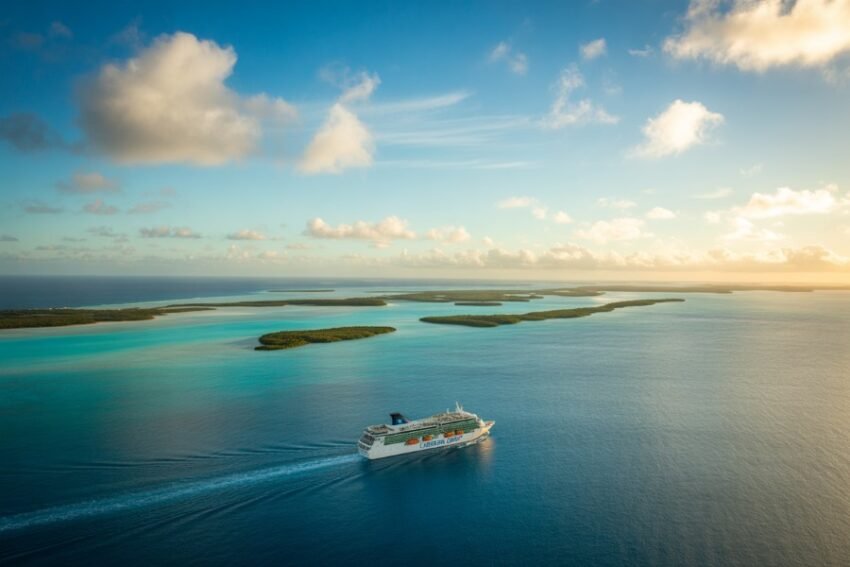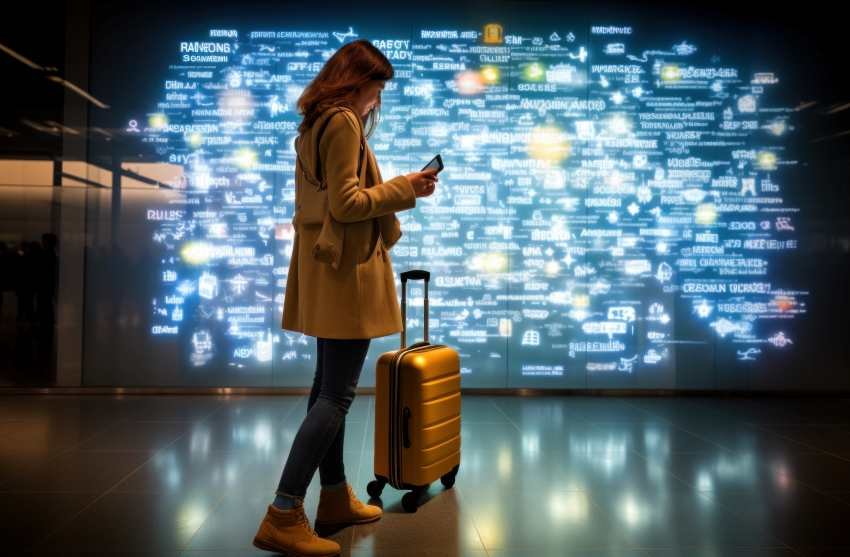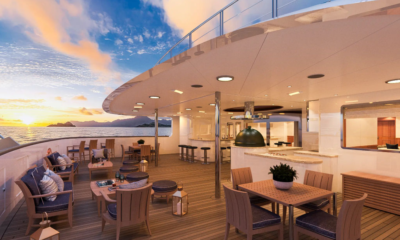Travel Trends
Eight Worldwide Travel Trends South Africa Can Embrace To Boost Its Tourism

Published on
August 6, 2025 |
By: TTW News Desk
As travellers worldwide are prioritizing wellness, sustainability, as well as immersive experiences, South Africa tourism can explore some unique opportunities for catering to these evolving preferences.
A recent trend report by highlights the key shifts transforming the travel landscape, from AI-curated sleep retreats to educational trips based on sustainability. These insights offer South Africa a chance to align with the growing global travel movement.
1. Travel That Tells A Story
Trend: Local Heritage-Inspired Stays
Travellers are increasingly seeking more than just a place to stay. They want an immersive experience that connects them to local history and culture. Hotels worldwide are drawing inspiration from local heritage, such as brutalist architecture or pyramid-themed suites.
SA Opportunity:
South Africa tourism can leverage its rich cultural heritage by focusing on township tourism, indigenous safari lodges, and collaborations with local artists. Authentic, design-forward experiences are in high demand, especially those that support local communities and provide Instagram-worthy moments.
2. The Sleepcation Thing Is Real
Trend: Wellness and Sleep Retreats
Top luxury brands have introduced sleep-focused retreats. These experiences combine diagnostics, meditation, and AI-assisted environments to promote better sleep.
SA Opportunity:
South Africa’s natural landscapes, such as the forests of Knysna and the stargazing pods in the Karoo, offer a perfect backdrop for wellness and sleep retreats. These locations can cater to the growing demand for restorative getaways.
3. Eco Everything
Trend: Sustainable Amenities Take Flight
Airlines and travel brands are moving towards eco-friendly offerings, such as plastic-free and biodegradable kits. Conscious travellers are becoming more aware of their environmental impact.
SA Opportunity:
South Africa’s hospitality sector can embrace sustainability by revisiting their amenity offerings. Adopting sustainable packaging, biodegradable options, and transparent environmental policies could make a significant impact and set local businesses apart.
4. Science + Wonder
Trend: Educational, Science-Infused Travel
Travel is increasingly blending learning with leisure. From space-themed resorts to marine biology experiences, educational tourism is on the rise.
SA Opportunity:
South Africa’s unique biodiversity, alongside stargazing locations like Sutherland, positions the country to offer science-based tourism. Family-friendly and educational experiences focused on conservation, astronomy, and the environment would appeal to curious travellers, especially Gen Z.
5. Gen Z Is (Still) Everywhere
Trend: Digital-First, Experience-Rich Travel
Gen Z travellers seek value and personalization in their travel experiences. Visual appeal is crucial, with social media-ready moments influencing travel decisions.
SA Opportunity:
South African destinations can cater to this by offering affordable, immersive experiences that are visually captivating. Creating experiences optimized for social media platforms can help even mid-tier offerings go viral.
6. Art Meets Experience
Trend: Instagrammable Exhibits and Pop-ups
Art is becoming interactive. Museums and exhibitions are transforming into tactile, shareable moments. Pop-up art experiences are a growing trend globally.
SA Opportunity:
South Africa’s vibrant arts scene offers an opportunity for unique, shareable experiences. Consider augmented reality street art tours, wine farms doubling as art spaces, or gallery pop-ups in stunning natural environments. These experiences would be highly Instagrammable and draw art lovers worldwide.
7. AI Is The New Travel Agent
Trend: AI Travel Planners and Chatbots
Many travel planning apps now use AI to curate personalized itineraries and offer real-time support. AI is streamlining travel planning and enhancing the customer experience.
SA Opportunity:
Local tourism operators and boards can integrate AI into their offerings. By providing customized trip planning — from safaris to urban tours — South African businesses can meet the increasing demand for personalized travel.
8. Proximity Escape
Trend: Hybrid Camping Experiences
Today’s travellers crave nature without sacrificing comfort. The demand for camping experiences that offer Wi-Fi, comfort, and a touch of luxury is rising.
SA Opportunity:
South Africa can tap into this trend with glamping experiences located near major city centres or along popular travel routes like the Garden Route. Offering luxury tents or Wi-Fi-enabled pods in the bush will appeal to those looking for a balance of nature and comfort.
South Africa Tourism: Why It Matters
The worldwide travel and tourism industry is expected to reach 16 Trillion USD by the year 2034, and South Africa tourism needs to adapt to stay competitive. Today’s travellers seek not just movement but meaning. South Africa, with its vast cultural richness and diverse landscapes, is ideally positioned to meet these new expectations.
By aligning with these emerging trends, South Africa can capitalize on the growing demand for immersive, purposeful travel experiences.
Travel Trends
Corporate and Government Travel Decline Leads to Sabre’s Lower-than-Expected Air Bookings, Joining Destinations Like the U.S., Europe, India, China, Australia, and Japan in Shifting Global Tourism Trends for 2025

Published on
August 8, 2025 |
By: TTW News Desk
Sabre, a leading global travel technology company, has experienced a significant downturn in air bookings, largely driven by reduced corporate and government travel. The company missed its revenue and earnings targets in the second quarter of 2025 and has revised its full-year expectations downwards as a result. Sabre, which has a higher exposure to corporate and government travel compared to its competitors, is now grappling with the ripple effects of these travel sectors’ decline, impacting its performance and the broader travel and tourism industry.
The Global Impact of Corporate and Government Travel Reductions
Sabre’s challenges are reflective of a broader global trend affecting the travel industry, as corporate and government travel has fallen sharply in several countries. Governments around the world have scaled back travel due to economic constraints, security concerns, and evolving work-from-home policies. Meanwhile, corporations in key markets are reducing business travel due to continued shifts in remote work, stricter budgets, and an overall slowdown in global business activity.
In the United States, a major market for corporate and government travel, federal agencies have cut down on travel spending, focusing instead on digital and remote solutions to reduce costs. Similarly, in Europe, particularly in Germany and the UK, corporate travel has seen a decline as businesses embrace hybrid work models and more cost-efficient alternatives, such as virtual meetings, over traditional face-to-face interactions.
Countries such as Australia and Canada, which have long been dependent on government and corporate travel for significant portions of their tourism and hospitality industries, have also reported downturns in this sector. The impact has been severe, as government-sponsored conferences, trade missions, and official business travel typically boost local economies and hospitality demand.
In Asia, markets like Japan and South Korea have similarly witnessed a pullback in both corporate and government travel. Japan’s corporate travel sector remains cautious amidst fluctuating domestic and international markets, while South Korea’s government has reduced international missions, limiting opportunities for tourism-related to business events.
This reduction in travel has translated into softer demand for related services such as flights, hotels, and car rentals, which directly affects the tourism sector globally.
Sabre’s Struggles Reflect a Wider Trend in the Travel Industry
In the second quarter of 2025, Sabre’s air bookings fell by 1% year over year, with corporate bookings experiencing a more significant downturn compared to leisure travel. Government and military travel saw the most significant declines, exacerbating the shortfall in air distribution bookings. Despite expectations of industry stabilization, Sabre faced a higher-than-expected dip in bookings, particularly in June and July. This unforeseen weakness led the company to revise its guidance for the rest of 2025, forecasting flat or low-single-digit revenue growth for the full year and reduced air distribution volume growth to 4-10%.
Kurt Ekert, CEO of Sabre, attributed the decline to the continued pullback in corporate and government travel, which has been a key driver of the company’s performance in previous years. Sabre’s exposure to these sectors means it is more vulnerable to shifts in the corporate travel landscape, as evidenced by its missed earnings targets.
Government and Corporate Travel Decline Affects Tourism
The decline in corporate and government travel is reshaping the landscape of global tourism, which has been slow to recover post-pandemic. Business travelers have long been a cornerstone of the global tourism industry, particularly for destination cities that rely on conferences, conventions, and official events to drive foot traffic. Without these events, tourism revenues in cities like Washington D.C., Berlin, and Tokyo have seen a noticeable dip.
As corporate travel continues to contract, tourism authorities in several countries are grappling with the impact on local economies. For instance, the drop in international and government-related tourism to major convention centers in the U.S. and Europe has led to a decline in hotel occupancy, restaurant business, and transport services, all of which are vital to tourism infrastructure.
Additionally, countries that depend on government-sponsored tourism, such as India and China, have been adversely affected. Both countries had large portions of their tourism economies tied to diplomatic visits, international trade fairs, and government-sponsored tourism initiatives. With these avenues narrowing, local tourism businesses are scrambling to find new sources of revenue.
The Ripple Effect on Hospitality and Travel Agencies
The fallout from reduced government and corporate travel is not just limited to tech companies like Sabre. It is also having a significant impact on the hospitality and travel agency sectors. Hotels, which often see a large portion of their bookings from business travelers, are adjusting their strategies to cater to the rise in leisure travel. However, the shift is not always enough to offset the loss of corporate and government bookings.
Travel agencies, too, are feeling the pinch. Many agencies, which rely on business and government contracts for large volumes of bookings, have had to diversify their offerings to attract leisure tourists. While leisure travel has surged in certain regions, it has not fully compensated for the loss of high-margin corporate business.
This shift in travel behavior has also caused disruptions in the airline industry, where many carriers rely on corporate and government contracts for their long-haul, premium services. The rise in remote work has led to a reduction in business-class bookings, while government travel restrictions and limited budgets have left airlines with fewer opportunities for high-revenue flights.
Shifting Strategies in the Travel Industry: A Focus on Leisure and Alternative Markets
As corporate and government travel declines, companies like Sabre are shifting their focus to other sectors of the travel market. Sabre, for instance, is now placing greater emphasis on leisure travel, where demand has remained more stable. The company is also focusing on increasing its hotel distribution bookings, which saw a 2% growth in the second quarter of 2025. By diversifying its portfolio and expanding into other markets, Sabre is trying to mitigate the effects of reduced corporate and government travel.
The global travel industry is also looking towards alternative and emerging markets to sustain growth. There has been a noticeable uptick in leisure travel, particularly to less traditional destinations, where travelers seek more off-the-beaten-path experiences. Countries that are often overlooked for corporate and government travel, such as those in Africa and Southeast Asia, have experienced growth in leisure tourism, drawing new visitors with their unique cultural offerings.
As international travel returns, some regions are seeing increases in tourism that is not dependent on business travel. These include destinations known for nature tourism, adventure travel, and cultural tourism. For example, places like Costa Rica, New Zealand, and Vietnam are attracting leisure travelers who are looking for unique experiences, diversifying the global tourism landscape away from traditional business-heavy destinations.
The Road Ahead: Navigating the Changing Landscape of Global Travel
While the decline in corporate and government travel presents challenges for companies like Sabre, it also creates an opportunity for the travel industry to evolve. The growing demand for leisure travel, coupled with the rise of digital tools for virtual meetings, presents an opportunity for companies to redefine their strategies and adapt to changing consumer behavior. As the travel industry shifts toward a more leisure-focused model, it will need to embrace flexibility and creativity to thrive in a post-pandemic world.
For Sabre, the road ahead will require recalibrating its expectations and continuing to focus on emerging sectors. While the decline in corporate and government travel has temporarily stunted growth, the broader shift towards leisure travel and alternative markets offers new opportunities. The company will need to expand its offerings, focusing on hotels, leisure travel, and emerging markets to weather the storm.
Ultimately, the effects of the decline in corporate and government travel are far-reaching, but the tourism industry’s ability to adapt will determine its resilience and long-term success in the evolving global travel landscape.
Travel Trends
BookTok Travel Experiences : EF Ultimate Break 1

The program represents a strategic pivot toward experience-based travel that capitalizes on social media-driven literary communities. Rather than traditional sightseeing, these tours emphasize shared cultural touchstones and fandom connections, with participants bonding over plot discussions and character analysis throughout their journeys. EF Ultimate Break’s approach transforms passive reading communities into active travel cohorts, demonstrating how digital book culture can translate into tangible tourism revenue. The company also extends this concept to existing book clubs, encouraging groups to replace living room meetings with international destinations.
Travel Trends
Press Release Distribution Services – WebWire

Thursday, August 7, 2025
12:21:04 PM ET
Digital travel platform Agodas latest Europe to Asia Summer Travel Trends data shows an increase in European traveler interest for Asian destinations.
12:18:23 PM ET
The GSMA hosted the second edition of its Digital Nation Summit Islamabad recognising the Ministry of Information Technology and Telecommunication (MoITT), the Pakistan Telecommunication Authority (PTA), and the Pakistans mobile network operators for their tireless efforts and contributions toward advancing the countrys digital landscape. During the summit, the GSMA …
12:14:39 PM ET
Originally set up by Kering and Conservational International in 2021, with Inditex joining in 2023, the Regenerative Fund for Nature has been supporting the transition to regenerative agricultural practices in fashions supply chains, building healthier ecosystems, supporting farmers, and strengthening communities.
12:08:42 PM ET
Assassins Creed Origins Ptolemaic Egypt has no shortage of famous historical figures including Ptolemy XIII and Julius Caesar, but its the Ptolemaic dynastys most famous queen, Cleopatra, thats the subject of a new exhibit at the Arab World Institute (IMA) in Paris.
11:43:33 AM ET
Dear Viv is a fitting tribute to The Vivienne who truly was a trailblazer in the world of drag. She showcased her artistry and talent brilliantly and paved the way for many to follow in her footsteps.
11:29:08 AM ET
The Academy of Motion Picture Arts and Sciences and the Academy Software Foundation (ASWF) announced that the Academy Color Encoding System (ACES), the global standard for color management, is joining the ASWF, a home for open source software developers in the motion picture and broader industries.
11:26:33 AM ET
You can do some nifty stuff with GameChat * and GameShare **, two new features exclusive to the Nintendo Switch 2 system. Get to know them better with a handful of games that pair great with each feature.
10:39:53 AM ET
In todays fast-paced digital landscape, creating visually appealing and organized content is essential. FlipHTML5s Booklet AI Generator is an innovative solution that empowers users to effortlessly design professional-grade digital booklets.
10:39:28 AM ET
Quantum Polymers is proud to announce that it has become the first South African manufacturer of adhesives to the food packaging industry to achieve ISO 22000 certification for its manufacturing facility, the internationally recognised standard for food safety management systems.
-

 Brand Stories3 weeks ago
Brand Stories3 weeks agoBloom Hotels: A Modern Vision of Hospitality Redefining Travel
-

 Brand Stories2 weeks ago
Brand Stories2 weeks agoCheQin.ai sets a new standard for hotel booking with its AI capabilities: empowering travellers to bargain, choose the best, and book with clarity.
-

 Destinations & Things To Do3 weeks ago
Destinations & Things To Do3 weeks agoUntouched Destinations: Stunning Hidden Gems You Must Visit
-

 Destinations & Things To Do2 weeks ago
Destinations & Things To Do2 weeks agoThis Hidden Beach in India Glows at Night-But Only in One Secret Season
-

 AI in Travel3 weeks ago
AI in Travel3 weeks agoAI Travel Revolution: Must-Have Guide to the Best Experience
-

 Brand Stories1 month ago
Brand Stories1 month agoVoice AI Startup ElevenLabs Plans to Add Hubs Around the World
-

 Brand Stories4 weeks ago
Brand Stories4 weeks agoHow Elon Musk’s rogue Grok chatbot became a cautionary AI tale
-

 Brand Stories2 weeks ago
Brand Stories2 weeks agoContactless Hospitality: Why Remote Management Technology Is Key to Seamless Guest Experiences
-

 Asia Travel Pulse1 month ago
Asia Travel Pulse1 month agoLooking For Adventure In Asia? Here Are 7 Epic Destinations You Need To Experience At Least Once – Zee News
-

 AI in Travel1 month ago
AI in Travel1 month ago‘Will AI take my job?’ A trip to a Beijing fortune-telling bar to see what lies ahead | China
























You must be logged in to post a comment Login